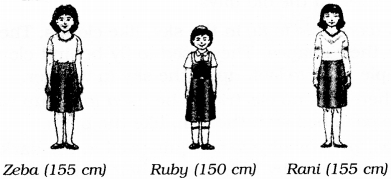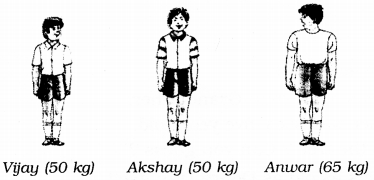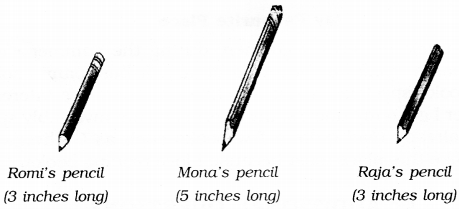NCERT Solutions for Class 6 English Honeysuckle Chapter 1 Who Did Patrick’s Homework? are part of NCERT Solutions for Class 6 English. Here we have given NCERT Solutions for Class 6 English Honeysuckle Chapter 1 Who Did Patrick’s Homework?.
| Board | CBSE |
| Textbook | NCERT |
| Class | Class 6 |
| Subject | English Honeysuckle |
| Chapter | Chapter 1 |
| Chapter Name | Who Did Patrick’s Homework? |
| Number of Questions Solved | 13 |
| Category | NCERT Solutions |
NCERT Solutions for Class 6 English Honeysuckle Chapter 1 Who Did Patrick’s Homework?
TEXTUAL QUESTIONS
(Page 11)
Working with the Text
Answer the following questions. (Refer to that part of the text whose number is given against the question. This applies to the comprehension questions throughout the book.)
Question 1.
What did Patrick think his cat was playing with? What was it really? (2)
Solution:
Patrick thought that his cat was playing with a doll. It was really an elf.
Question 2.
Why did the little man grant Patrick a wish? (2)
Solution:
The little man granted Patrick a wish because Patrick had saved him from the cat.
Question 3.
What was Patrick’s wish? (3)
Solution:
It was Patrick’s wish that the elf should do all his homework till the end of that semester.
Question 4.
In what subjects did the little man need help, to do Patrick’s homework? (5, 6)
Solution:
The little man needed Patrick’s help in English, Math and History.
Question 5.
How did Patrick help him? (7)
Solution:
Patrick had to work very hard to help the elf. He stayed up nights and felt very weary.
Question 6.
Who do you think did Patrick’s homework-the little man, or Patrick himself ? Give reasons for your answer. (9, 10)
Solution:
Patrick did his homework himself. The little man wrote the answers in the answer book. But it was Patrick who was telling him what to write all the time.
Working with Language
Question 1.
A. Fill in the blanks in the sentences below with the words or phrases from the box. (You may not know the meaning of all the words. Look such words up in a dictionary, or ask your teacher.)

1. Some people find household ________ a bore, but I like to help at home.
2. Who stole the diamond is still a ________ .
3. This ________ we are going to have a class exhibition.
4. _______ _, the elf began to help Patrick.
5. Can you ________ this word in the dictionary?
6. I started early to be on time, but I was ________ There was a traffic jam!
7. She says she’s got a lot of books, but _______ _, I think most of them are borrowed.
Solution:
- chores
- mystery
- semester
- True to his word
- look up
- out of luck
- between you and me
Question 2.
B. Use the clues given below to complete this crossword puzzle.
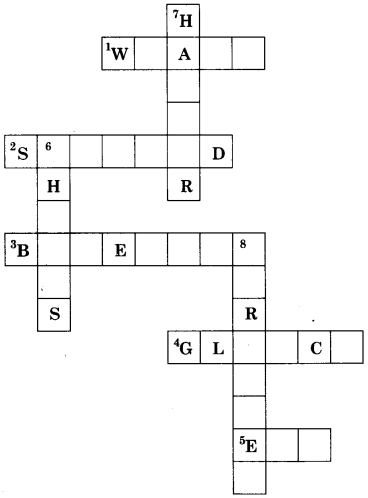
Across
1. very tired
2. had an angry look on the face
3. short trousers
4. a fault in a machine that prevents it from working properly
5. a small and naughty boy-fairy Down
6. work that must be done every day, often boring
7. a basket with a lid
8. gave a short, high-pitched cry
Solution:
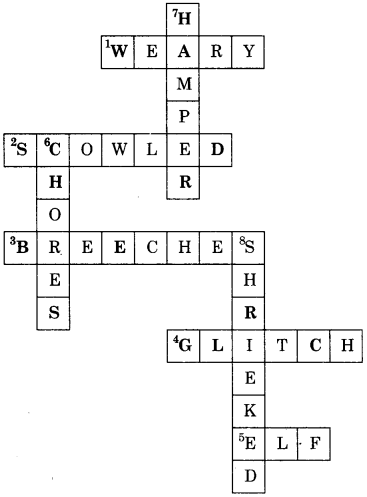
Speaking
Question 1.
A. In the story, Patrick does difficult things he hates to do because the elf pretends he needs help. Have you ever done something difficult or frightening, by pretending about it in some way? Tell your classmates about it.
Solution:
Yes. Once I was asked to make a speech on the occasion of Gandhi Jayanti. The speech was to be made before all the students and the teachers of the school. I thought it was very difficult. My class teacher, however, encouraged me and I was able to do my job well.
Or
Say what you feel about homework (The words and phrases in the boxes may help you.) Do you think it is useful, even though you may not like it? Form pairs, and speak to each other.
For example :
You may say, “I am not fond of homework.”
Your partner may reply, “But my sister helps me with my lessons at home, and that gives a boost to my marks”.

Solution:
A. I do not like homework.
B. But my sister helps me. Now, it gives a boost to my marks.
A. This idea doesn’t appeal to me. I am afraid it will be cheating.
B. No. It’s not cheating. My sister supports me by explaining the difficult points only.
A. I see. So, you slowly develop a liking for it yourself.
B. Exactly. I have taken to doing my homework very regularly.
A. Well, I will also try to develop a taste for it. Does the idea of having some help-books appeal to you?
B. Sure. They say it can be a boon if used properly.
A. I am keen on trying it soon.
B. Good. I am sure, you will soon take to doing your homework.
Writing
Question 1.
A. This story has a lot of rhyming words, as a poem does. Can you write out some parts of it like a poem, so that the rhymes come at the end of separate lines?
For example :
Patrick never did homework. “Too boring,” he said.
He played baseball and hockey and Nintendo instead.
Solution:
The following are the other rhyming words
- He had a little wool shirt with old-fashioned britches and a high tall that much like a witch’s.
- Save me! Don’t give me back to that cat I’ll grant you a wish. I promise you that.
- He kicked his legs and doubled his fists and scowled and pursed his lips.
- “Help me! Help me!” he would say. And Patrick would have to help in whatever way.
- Here, sit down beside me, you simply must guide me.
- Elves know nothing of human history, to them it’s a mystery.
- So the little elf, already a shouter, just got louder.
- As a matter of fact, every day in every way the little elf was a nag Patrick was working harder than ever and was it a drag!
- As for homework, there was no more, so he quietly and slyly slipped out the back door.
- Patrick got his A’s; his classmates were amazed, his teachers smiled and were full of praise.
- Cleaned his room, did his chores, was cheerful, never rude, like he had developed a whole new attitude.
Question 2.
B. Look at these Sentences.
1. “Too boring”, he said.
2. Cleaned his room, did his chores.
When we speak, we often leave out words that can easily be guessed. We do not do this when we write unless we are trying to write as we speak (as in the story).
So, if we were to write carefully, we would say:
- “Homework is too boring”, he said.
- He cleaned his room and did his chores.
Solution:
No answer required
Question 3.
C. Rewrite the following incomplete sentences carefully, so that the reader does not have to guess what is left out.
1. more and more books
2. too difficult
3. got up late, missed the bus
4. solved the mystery
Solution:
1. Patrick had to read more and more books.
2. Patrick had to help the elf whenever the homework was too difficult.
3. One day Patrick got up late and thus missed the bus for school.
4. Newton solved the mystery why the apples fall on the ground.
Question 4.
D. Look at this cartoon by R.K. Laxman. Read the sentence given below
the cartoon. Discuss the following questions with your partner.
- What is it about?
- Do you find it funny? If so, why?
- Do you think a cartoon is a serious drawing? Why or why not?
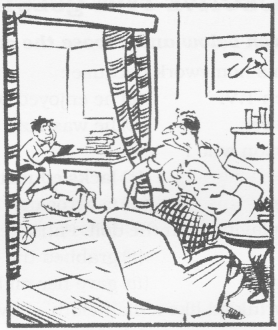
Solution:
- The cartoon is about the problem of today’s child. The child is overburdened with his homework.
- No, I don’t find it funny. I feel so because it exposes our faulty system of education seriously.
- Yes, I think a cartoon is a serious drawing. It is because it exposes our faulty social system. It does so in a humorous way. Still, it pinches our sentiments. It makes us think about the problem seriously.
We hope the NCERT Solutions for Class 6 English Honeysuckle Chapter 1 Who Did Patrick’s Homework? help you. If you have any query regarding NCERT Solutions for Class 6 English Honeysuckle Chapter 1 Who Did Patrick’s Homework? drop a comment below and we will get back to you at the earliest.


